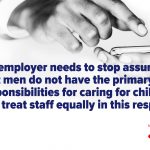What do you think about men working in childcare? More specifically, what percentage of the childcare workforce do you think is male? Would you care to have a guess? I won’t keep you in suspense. The figure is just 3%.

With that in mind, I was delighted when David Wright agreed to participate in my latest ‘Dadbloguk Q&A.’ David is part of a family team that runs the Paint Pots group of childcare settings in the Southampton area.
I’ve watched David from afar on social media for some time. He will often crop up on twitter, making a comment or retweeting something in support of making the childcare workforce more inclusive of men.
Speaking to David for this Q&A has been eye-opening. In addition to asking what it is like being male and working in the early years sector, I simply couldn’t resist asking for his opinions on the cost of childcare and Ofsted.
His responses have been refreshingly honest and, be you a parent or childcare professional, I think you’ll find them insightful. I feel I have said enough so I shall let David introduce himself.
David, can you please introduce yourself and Paint Pots.
Paint Pots is a small family group of childcare facilities, currently comprising six day nurseries, three preschools and one out-of-school club all located in the Southampton area. My wife, Anna, started Paint Pots in 1994. Following a 25 year career in IT, I joined Anna in running Paint Pots 15 years ago, retrained as an Early Years Teacher and we have been working together ever since. We were joined by our son Joseph eight years ago, who also trained as an Early Years Teacher and more recently by our youngest daughter, Jasmine, who is an apprentice with the company.
My wife and I know more than most just how precious children are, having sadly lost two of our own children: Samuel who died of cot death, aged seven months and William who was not strong enough to survive the operation he needed on the day he was born, three months prematurely, as one of triplets. As a dad, I understand the immense privilege we have forming relationships with young children, as well as the awesome responsibility.

A quick look at the Paint Pots blog reveals you are a huge advocate of men working in the early years and childcare sectors. Why is this and what do they bring to the table?
As a man working in the Early Years sector, it is very evident that I am in a tiny minority. My belief is that young children benefit from having the opportunity to interact with people who reflect the community they live in. This includes men and women.
Men to do not necessarily bring anything to the role of Early Years Teacher that women do not provide. We are all individuals who bring the best of ourselves to our role. I think it is important for children to see men in caring roles and for gender stereotypes to be challenged. Not all men are strong, sporty, outdoors types. Many women are!
You’ve also written a book about men working in childcare called Men In Early Years Settings. What was the inspiration for this?
Both myself and Simon Brownhill my co-author asked ourselves why men are kept from participating in the learning, development and care of very young children. Whilst studies have previously recorded some of these issues, there has been no previous book targeted at practitioners and decision makers, providing supportive material for reflection and practical guidance to address the current gender inequality in the workforce. We wanted to provide a research-informed/practical book that adds to the debate, provides encouragement and inspiration but also acts as a framework for self-evaluation and action planning.
The book explores the current situation, the beliefs and attitudes that underlie our culture, and the impact that these have in creating barriers to employment of men in the Early Years workforce. It also considers whether men have a valid role as Early Years professionals, how this relates to a non-gendered professional identity, and whether their presence in the workforce makes a difference. Expectations, fears, perceptions and pressures to conform to stereotypes are all discussed.
Our book invites readers to take action, to further their own knowledge, to network, to contribute to the debate, and to explore and add to the resources listed in the final chapter.
Can you give examples of childcare providers or countries that are getting it right in your opinion and have a good balance of male / female workers in the childcare sector?
It is a challenge globally. The view that childcare is women’s work seems to be deeply entrenched in all cultures. We do have several examples in the UK of providers who have actively managed to attract, recruit and retain male Early Years team members, including the London Early Years Foundation, Little Forest Folk in south London and Kids Allowed in Manchester.
In each of these examples, it is a strong leader who determines the culture of the organisation, who is committed to a mixed-gender workforce and who has an explicit policy to recruit and support men in their teams. We can also look to some of the Nordic countries; Norway, Sweden and Finland for examples of more mixed-gender teams. Even here it is a mixed picture with pockets of success and other areas where the workforce continue to be entirely female.
What has it been like for yourself, being male and a childcare provider?
In some respects, I get away with being a man because I work with my wife. One of the things we try hard to do is to normalise the culture where children being cared for by men and women is what we do. It is not noteworthy.
On the whole, our parents are very supportive of the seven men working in Paint Pots but just this week I had to defend one of them against a request from new parents that they did not want him to be involved in their child’s toileting. I explained politely why this would not be possible.
You recently made a few media appearances discussing the joint Fatherhood Institute / Dept for Education scheme to get more men working in childcare. Can you tell us a bit about this?
I have been working with the Department for Education for the last three years to try and raise the issue more widely and for it to become a policy item. I chaired a Task and Finish group of experts and we produced a report for the Government. The recent announcement of funding for the Fatherhood Institute to produce resources and organise a national conference in London this September, is the outcome of this work. I see it as a positive step forward.
Moving on from gender, what do you love about your occupation?
Making a difference in the lives of children and their families. Seeing our team members develop as individuals, supporting them through the ups and downs of life and influencing the wider Early Years agenda nationally and internationally.
We run our own charity, Families First Southampton that does a lot of work with dads and kinship carers in our city. I have just returned from the World Forum on Early Childhood Education in Macau, attended by 700 delegates from 72 countries. It was truly inspiring.
Next month, I am taking three of our team to Kenya for a week to volunteer in a baby rescue centre. It helps me see that all children across the World have needs and rights and that in a small way I can make a difference.
Childcare is often criticised for being expensive. How do you respond to this?
Often childcare is used as a pejorative term to describe the notion of low-skilled, low-status, poorly remunerated babysitting or taking care of children in order to release parents and in particular mothers, to return to the workforce so they can contribute tax revenues. Early Years education is similarly viewed by some as a preparation process for formal education to give children the best start on the path of becoming productive citizens, also contributing to GDP.
This contrasts with the argument that as a nation, we should be directing our best resources to the nurture, development and encouragement of our youngest children during their formative years. To achieve this requires quality provision with skilled, trained Early Years teachers. We have (rightly) high staffing ratios in the UK for children under 5. Staffing is a major expense but many of our team are paid just close to minimum wage. This is not fair and does not value them for the vital role they perform. We need to decide as a nation how we want to pay for this, through taxation, as happens in many European countries, or whether we continue to push these costs onto parents.
Okay, I’m being mischievous now. Complete the following sentence. Ofsted is. . .
As providers with the duty and responsibility for the care and education of very precious young children, we recognize the need for accountability and a regulator to ensure standards are maintained. We have experienced many inspections over the last 26 years. The vast majority have been very positive.
Occasionally they have been less so. This is more to do with the individual involved rather than the system and this has been and continues to be an area for review. Where standards are assessed fairly and objectively and there is agreement on the outcomes based on solid evidence, there is no disagreement however there are occasions when the ‘professional judgement’ of an individual inspector is at odds with the interpretation of a finding by the party being inspected and there is little scope for discussion. These things matter!
An inspection outcome is linked to reputation, funding and ultimately business sustainability. It cannot be right that this should rest on equivocal decisions based on subjectivity.
I am a great believer in positive engagement. I am actually speaking to an audience of 120 Ofsted inspectors next month (I’ll let you know if I make it out of there). In recent years we have been involved as part of the steering group for the South East region #OBC (Ofsted Big Conversation), a movement that brings Ofsted and Early Years providers together and has proven to be a vehicle for positive change. It continues to be a very worthwhile forum for dialogue.
Finally, what three bits of advice would you give to a mum or dad looking for a nursery setting for their children?
Our belief is that you need to find the right place for you and your child. Inspection reports and accreditations are no substitute for a personal visit to check:
- Are the children calm, safe and happy?
- Are the staff friendly and proud of their work?
- How do the staff interact with the children?
For a full quality checklist, visit our website.
What is your opinion?
Do you have an opinion about anything David has said? How do you feel about the low number of men working in childcare? Maybe you are a guy who works in this sector? Maybe you have some opinions on Ofsted or the cost of childcare?
If so, please do comment below. It would be great to find out other people’s views and get a conversation started on these subjects.







8 thoughts on “Men working in childcare: Q&A with David Wright of Paint Pots nurseries”
Thank you for sharing this- it’s such an important topic. I believe if we want to truly address gender inequality for both sexes, it has to start with kids. Showing them it’s ok to play with whatever toys they want. Showing them that men do childcare too is a vital part of that. We aim to split childcare 50/50 in our family, though don’t always succeed. Thanks for sharing about Forest Folk- they just opened one in my area so I’m on the wait list now!
I merely had the idea, David provided the answers! And yes, both sexes stand to gain from seeing men in caring roles. It is no different from seeing women in managerial roles and yet it doesn’t get the same recognition.
A really fascinating and inspiring read. I would love to see more men working in the childcare industry. I want my girls to see that men are as capable and welcome to help care for children as women. Hopefully with work such as this, over time things will change.
I also agree with the comments on cost. I dislike paying so much for childcare. But I want to know the staff caring for my child are trained, happy and renumerated fairly for the vital work they do. They deserve the opportunity to make a real career and not be earning a low salary when it is a skilled profession that demands a lot of care and focus. I do agree that the way the society in the UK views children is really divided, with many seeing them as a gift to nurture and others seeing them as a burden that parents should fund. But in my view, in the same way as we provide benefits to support those adults in need, we should invest better in early years education. I get so fed up of new government schemes which, when you really do the maths, barely pay a setting enough to cover basic costs.
Well said. I believe that certain things should be outside the scope of a government so they cannot simply be altered every four years. A cross party working group for childcare would really be welcomed.
Seconded Joseph! These should be long-term ambitions, it’s the only way to change the status quo.
No disagreements here Angela! This isn’t a men’s rights issue, it’s about a more equitable society that benefits everyone. That means recognising men are capable carers and recognise this, just as we have, over recent decades, come to think nothing of women in the armed forces, politics business and so on.
As for costs, it’s quite a hard-hitting thing to say some people consider children a burden while others consider them something to nurture but it is true. I also don’t quite get how the Government pays childcare setting so little. I know it’s often just a few pounds an hour, barely covering costs if it even does.
I have been an advocate of men in childcare since starting my event childcare business in 1992. I’m proud that many of the young people who used our service now work for us and have gone on to train as EYPs or Primary teachers. We have moved on since the days when parents refused to let a male childcare worker even hold their child, but like David, we do get the toileting question from time to time! My response is “does their Dad/ Grandad/uncle/brother/ never take them to the toilet?”
I am afraid I have heard the argument used about male childcare workers accompanying kids to the lavatory. Hopefully attitudes are changing. Glad to hear you have had so many use your service.